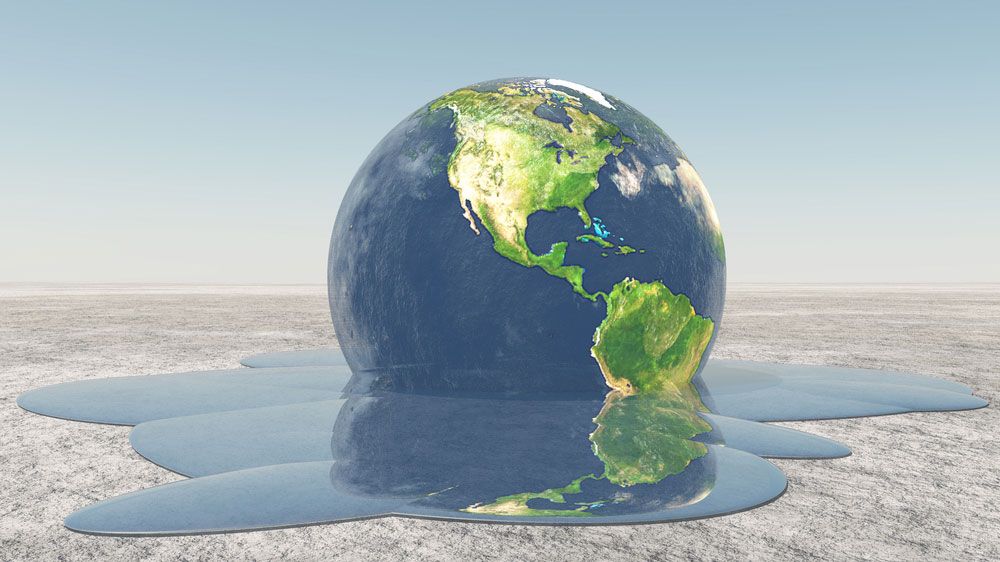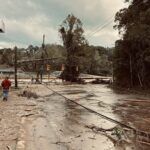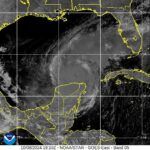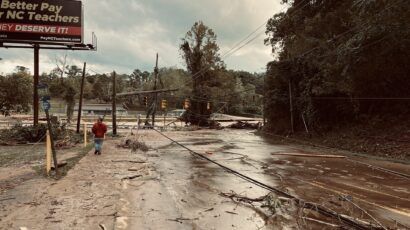Climate: the new abnormal
By Dawn Stover | August 26, 2014
 Earth melting into water. Bruce-Rolff, Shutterstock
Earth melting into water. Bruce-Rolff, Shutterstock
When did journalists start calling everything from multigenerational households to breastfeeding to mediocrity “the new normal”? If those things aren’t the old normal, I don’t know what is.
But “the new normal” is a phrase that is also cropping up with great frequency in articles about climate change—where things really are shifting dramatically. Extreme rainfall and heavy flooding are “the new normal.” Likewise water shortages, early-season wildfires, and a melted Arctic Ocean with giant waves. “We have to adjust to a new normal that we created,” climate activists from the Center for American Progress write. “It’s up to us how much worse it will get.”
There’s a dangerous psychology at work here. The “new normal” meme, put forward by climate scientists as well as headline writers, is intended to make people realize how weird the world’s weather has become, and to encourage them to plan for an altered climate. But what if the phrase is having just the opposite effect? What if it’s sending the message that global warming (or global weirding, if you prefer) is actually ordinary? New, but normal.
In reality, there is nothing normal about what’s happening to the world’s climate—even though global warming isn’t new.
Climate amnesia. As the secretary-general of the United Nations’ World Meteorological Organization recently told Reuters, global warming has been going on so long that most people under the age of 30 have not lived in a world without it. Even people who have been around longer have difficulty remembering what the world was like during an earlier time in their lives, let alone how it was for earlier generations.
How many people today can remember what life was like before the existence of nuclear weapons, for example? In 2011, when Newsweek asked 1,000 US citizens to take the country’s official citizenship test, 73 percent of them couldn’t say why the United States had fought the Cold War. Yet if the lack of widespread protest is any indicator, most Americans consider it normal for their country to possess thousands of nuclear weapons even today, many of them aimed at Russia.
Each generation redefines what is normal. In the future, people may not even remember what it was like to live in a place where you could work and play outdoors without risk of heat stroke, or be comfortable indoors without air conditioning. And when people forget how things were for earlier generations, or even within their own lives, they no longer aspire to protect or reclaim the resources they once had.
Shifting baselines. Adaptation to climate change will indeed be necessary. But adaptation is a dangerous thing when it prevents us from seeing the big picture—the drastic changes taking place on our planet.
In 1995, marine biologist Daniel Pauly used the term “shifting baseline syndrome” to describe how declines in the size, numbers, and species of fish go unnoticed because experts have forgotten that there were once more (and bigger) fish in the sea: “Each generation of fisheries scientists accepts as a baseline the stock size and species composition that occurred at the beginning of their careers, and uses this to evaluate changes. When the next generation starts its career, the stocks have further declined, but it is the stocks at that time that serve as a new baseline. The result obviously is a gradual shift of the baseline, a gradual accommodation of the creeping disappearance of resource species, and inappropriate reference points for evaluating economic losses resulting from overfishing, or for identifying targets for rehabilitation measures.”
The shifting-baseline problem extends far beyond ocean fisheries. It’s why a world without virgin forests, free-running rivers, sprawling coastal wetlands, vibrant coral reefs, and native prairies seems normal to people who have never seen them in their glory—and even to some who have. It’s why people aren’t working harder to bring back 100-pound salmon and 9-inch-long oysters.
Ignorance of everything but the recent past is what makes some people think that global warming has stopped or even reversed. Global average surface temperatures have been rising at a slower rate during the past 15 years than in earlier decades, so focusing on only those recent years suggests that global warming has “paused.” During the past 135 years, however, there have been several other periods when warming slowed only to resume its steady overall rise.
Shifting baselines pose a major conservation problem: How do you convince people that their world is undergoing huge changes, such as global warming and mass extinction, if they are unable to perceive changes that take place over more than just a few years? And is it even possible to regain what has been lost?
There are ways to help people remember. For example, before-and-after photographs show us how landscapes have changed rapidly over relatively short periods. Graphic representations of trends can make people take notice of everything from rising temperatures to falling groundwater levels. Historians could play a more important role in informing the public. E.J. Milner-Gulland, a researcher at Imperial College London who studies the interface between ecology and human behavior, suggests that conservation organizations should enlist older people to inform younger generations about how the environment has changed.
Creating abundance. There is little research on how people perceive a changing world, but their perceptions can have a profound influence on the effectiveness of interventions to combat climate change. Human behavior is where adaptation and mitigation—the twin remedies for climate change—butt heads. Most people are willing to make adjustments when their own survival is threatened. But preemptive changes in energy infrastructure, taxation, and regulation strike many people as a luxury they can’t afford.
Unfortunately, the world’s regulatory systems have been built on shifting foundations. Water, fish, and other resources are allocated based on short-term histories and best-case scenarios—and with the idea that all of the available resources can and should be used now, rather than reserved for the future. For example, research just published in Environmental Research Letters concludes that California has issued surface water rights totaling about five times the state’s average annual runoff. This is why mighty rivers run dry and fisheries collapse.
As Mary Christina Wood points out in her 2014 book on environmental law, Nature’s Trust, even in this era of failing ecosystems and intensifying climate crisis, “environmental agencies worldwide use their authority to permit the very harm that they are supposed to prevent.” Wood argues for a regulatory and legal framework that instead protects and restores the planet’s natural assets. The Earth Endowment, as she calls it, “once held an amount of wealth that can scarcely be imagined today.”
Humans have exploited and devoured these natural resources to create personal wealth and an illusory abundance of manmade products and technological innovations. True prosperity will come only when a healthy climate becomes a worldwide goal, and people begin working together not only to conserve the resources around them, but also to increase them for future generations—like building principal in a financial account. The first step is remembering what we once had and reestablishing that as a baseline for comparison.
Unfortunately, world leaders are already discussing a global temperature rise of 2 degrees Celsius (above the preindustrial level) as if it’s their new baseline rather than the ceiling it was meant to be. From there, it’s only a matter of time before 4 degrees becomes the new, new normal.
Together, we make the world safer.
The Bulletin elevates expert voices above the noise. But as an independent nonprofit organization, our operations depend on the support of readers like you. Help us continue to deliver quality journalism that holds leaders accountable. Your support of our work at any level is important. In return, we promise our coverage will be understandable, influential, vigilant, solution-oriented, and fair-minded. Together we can make a difference.
Topics: Climate Change, Columnists















